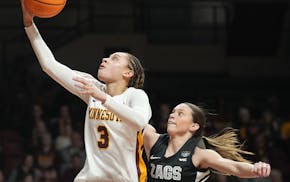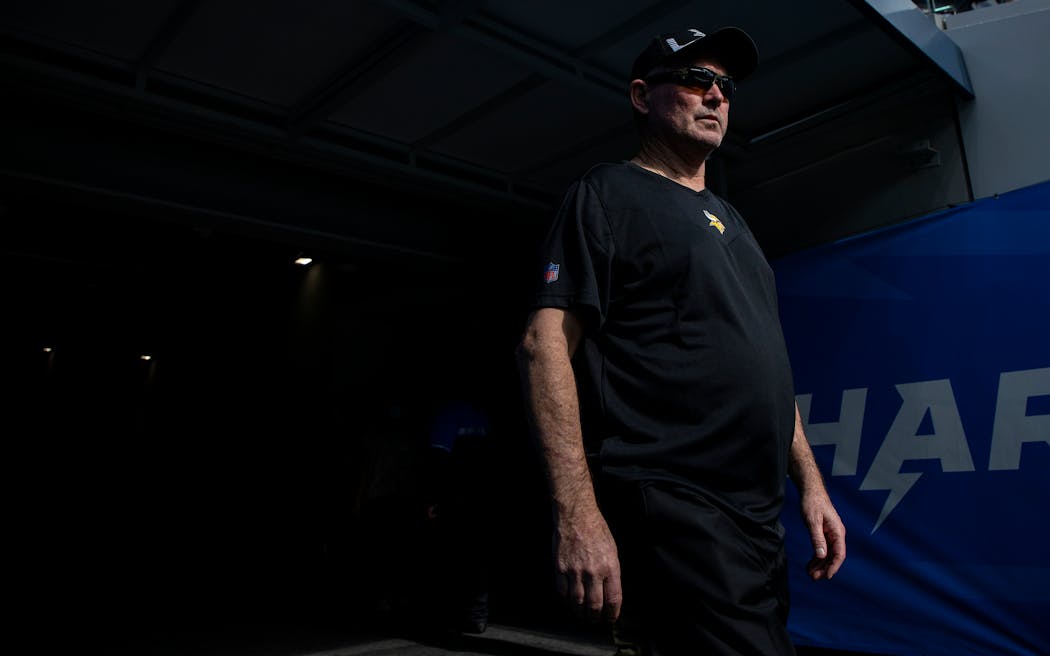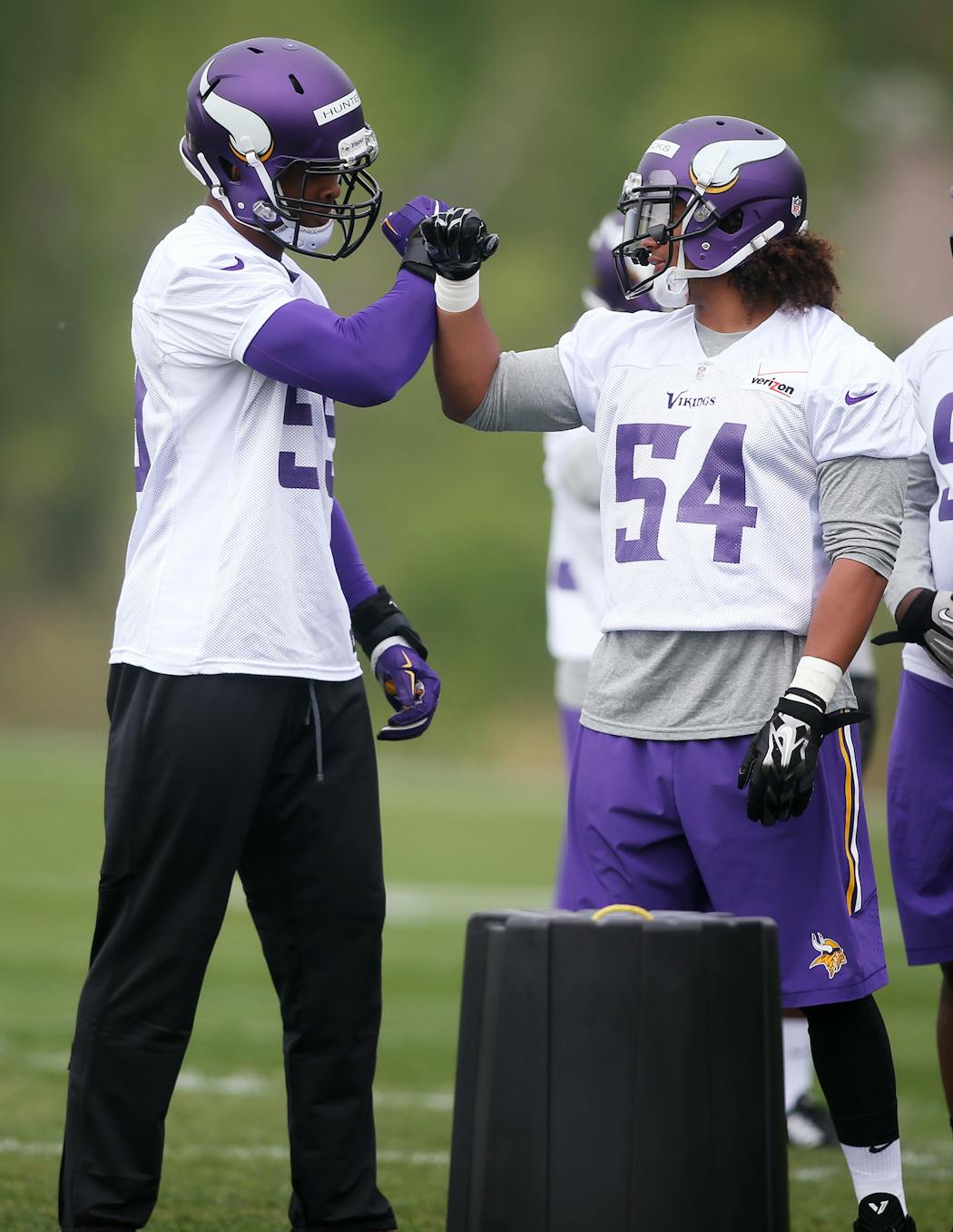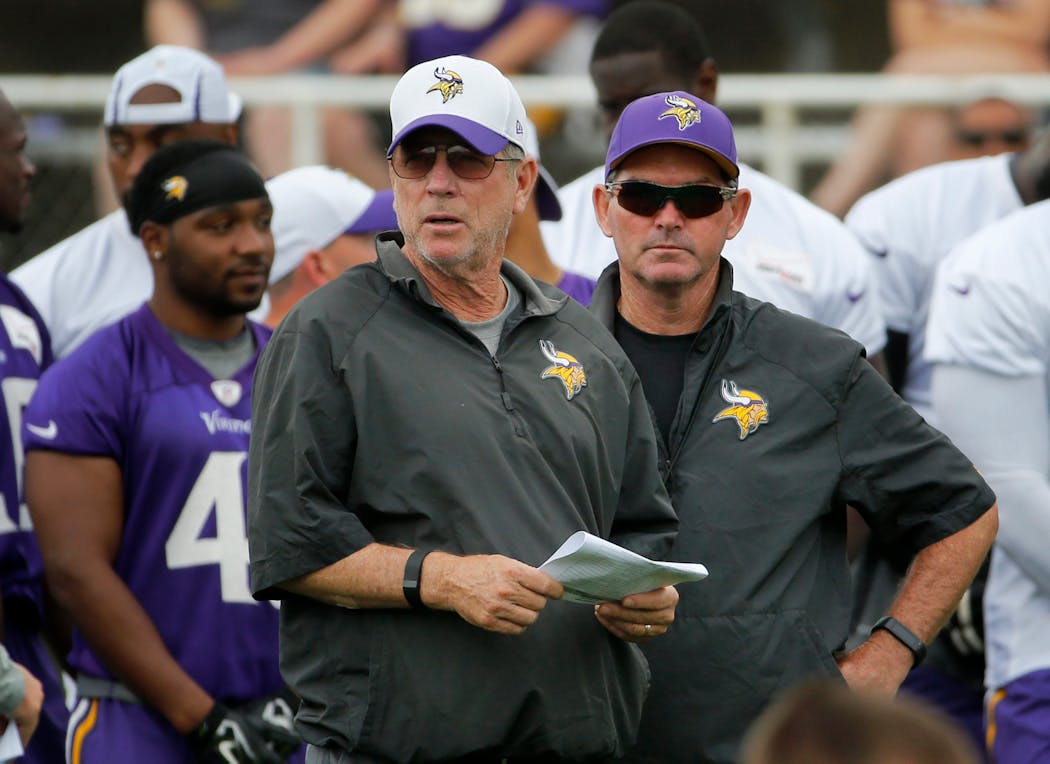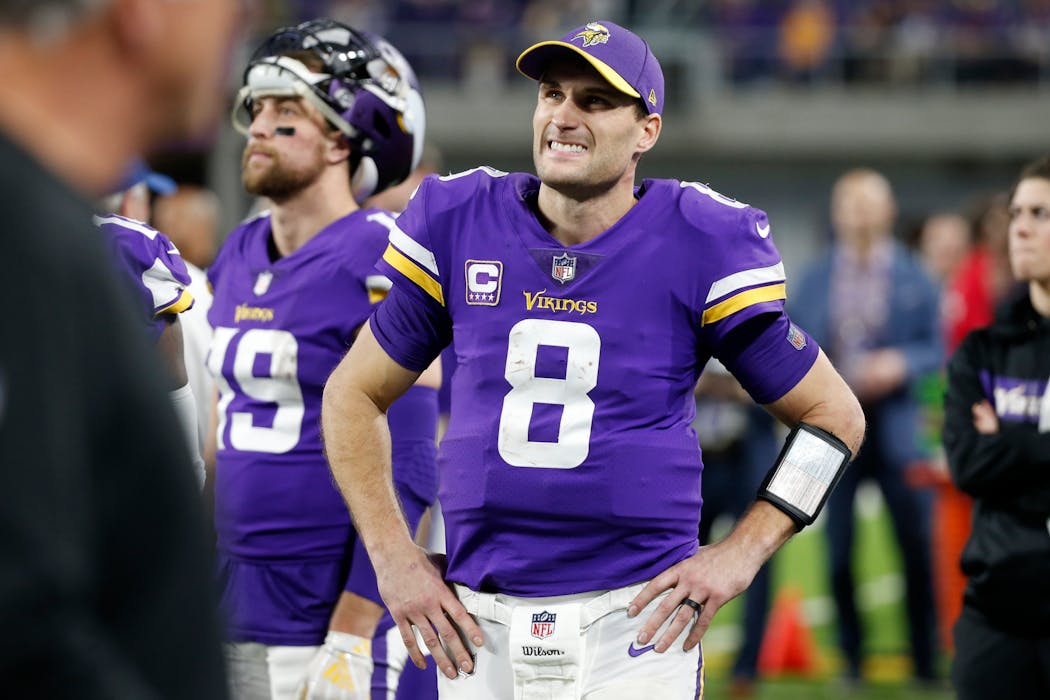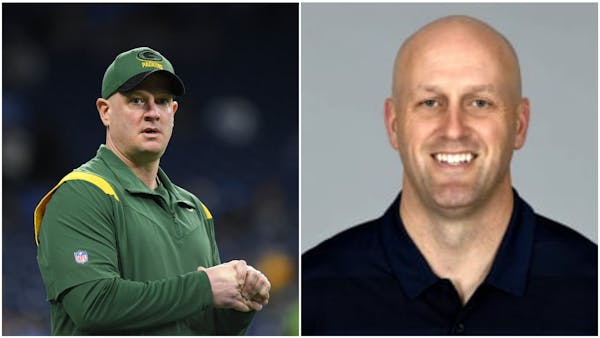On Monday morning, as Vikings players gathered for a team meeting a day after beating the Chicago Bears in the final game of the season, General Manager Rick Spielman was there to give them news he did not expect to deliver. Coach Mike Zimmer was not there at all.
Vikings owners Zygi and Mark Wilf had decided late Sunday night to fire both men from jobs they'd held longer than most of their NFL counterparts. Zimmer's firing seemed a foregone conclusion after back-to-back losses to the Rams and Packers ensured the Vikings would miss the playoffs for the second straight year. Spielman showed up at work on Monday morning expecting the coach's dismissal, but not his own.
The general manager, who'd run the Vikings' football department for 16 years, told a roomful of players he'd signed and drafted what was going to happen, in a meeting that brought some in the room to tears and left others unsure how to react. Spielman spent the day at the Vikings' facility saying goodbyes and thank-yous.
Zimmer had shared his appreciation for the team's work ethic in a Saturday night meeting before the Bears game. He released a statement through the team Monday afternoon, saying, "I'll miss coaching the players, some who have been with me for all eight years. I want to thank the players who welcomed me in 2014 and believed in me that I could lead them to be great."
But those words would have to serve as the final goodbye to his team.
The Vikings began their searches for a new general manager and head coach last week, following the biggest set of leadership changes they've made in 16 years. In a Monday news conference, co-owner Mark Wilf emphasized a focus on "strong leaders, communicators, collaborators."
For eight years, Zimmer's unremitting approach yielded more wins than any coach in Vikings history not named Bud Grant or Dennis Green, but ultimately wore thin without consistent postseason success to provide a buffer.
This article is based on conversations with more than 20 people with the team or close to the organization, who were granted anonymity to speak freely about their experiences during Zimmer and Spielman's eight years together. Some saw a coach whose constant prodding and demand for precision brought out the best in players, particularly on defense (the Vikings ranked in the top 10 in points allowed each year from 2015-19). But as the team finished out of the playoffs the past two seasons, losing key late-season games each time, many described a working environment that was too impersonal, too unresponsive to change and left them too much on edge.
Individual players, or entire position groups, showed up to work wondering if they'd be dressed down in team meetings, or asked to respond to something the coach said about them in a news conference. Though Zimmer spent much of his time with the defense during the week, he weighed in on the offense enough — on the headset during games, in team meetings or in public comments — to make play-calling a delicate act for many of his six offensive coordinators, especially if they didn't run the ball enough.
Veteran assistants like Tony Sparano, the Vikings' offensive line coach from 2016 until his death in 2018, or co-defensive coordinator Andre Patterson did damage control with players stung by Zimmer's public criticism or silence (sources said defensive end Danielle Hunter experienced the latter after choosing season-ending surgery on a neck hernia in 2020). Players tried to return quickly from injuries, fearful a longer recovery time would jeopardize their standing in the organization.
Even in the NFL, where players are no stranger to regimented cultures, the Vikings' approach grew stale. As the team starts general manager and head coach interviews this week to replace Spielman and Zimmer, who at 65 was one of the oldest head coaches in the NFL, it seems a major culture shift is coming.
"I think just having that voice, no matter how big your role is, is important, to listen up and take each other's feelings into account," linebacker Eric Kendricks said on Monday. "I don't think a fear-based organization is the way to go."
Defensive dominance; offensive disconnect
After the Vikings fired Leslie Frazier following the 2013 season, Spielman and Zimmer clicked in a job interview as two coaches' sons who shared an appreciation for the old-school ethos they'd learned from their fathers.
Early on in their time together, the partnership appeared to be just what the Vikings needed.
A longtime NFL defensive coordinator, Zimmer hired Norv Turner — the offensive architect of two Cowboys Super Bowl teams in the mid-1990s — to call plays and lead the Vikings' search for a new quarterback, while Spielman gushed about the tutorials Zimmer gave the Vikings' scouting department on the types of players he wanted. The first product of that approach was linebacker Anthony Barr, a 6-foot-5 linebacker who'd been projected as a pass rusher in a 3-4 defense, but came to the Vikings as the ninth overall pick in 2014, eventually going to four Pro Bowls as a 4-3 linebacker.
The coach unlocked safety Harrison Smith's talents, using him to do everything from lurking in the middle of the field and bracketing top receivers to rushing the quarterback and bailing out of blitz looks after offenses had already assigned a blocker to him.
"I really started to understand the game a little more once Zim came," Smith said in December. "How defenses are assembled, how the pieces of a defense kind of rely on one another. And then, he's always been a guy that has given everything he has. Whether we win or not, he's always just grinding himself down to give us the best chance to win. Being around that, you appreciate it, and you don't want to let a guy like that down."
Though their draft philosophies would diverge in later years, as Zimmer grew tired of Spielman's trades back in the draft to accumulate more picks, the two struck gold in the 2015: picking Kendricks in the second round and Hunter in the third, after finding a starting corner (Trae Waynes) in the first and before drafting a Pro Bowl receiver (Stefon Diggs) in the fifth.
The group's first victory over the Packers — as Zimmer's defense stymied Aaron Rodgers and the Vikings snatched the 2015 division title away from Green Bay in a Week 17 Sunday night game at Lambeau Field — ranks as one of the defining moments of his tenure.
But even by that point, tensions were forming on the offensive side of the ball.
After the 2014 season, according to a source with knowledge of the situation, Zimmer went to Hue Jackson, asking his friend from the Bengals' coaching staff to teach him more about offensive play-calling so he could better evaluate Turner. Zimmer grew more outspoken about pass plays he didn't like, or a need to run the ball more, on the coaches' headset during games in 2015, even as the Vikings ranked fourth in the NFL in rushing offense while Adrian Peterson won his third rushing title while leading the league in attempts.
Behind the scenes, Vikings decision-makers clashed about how to use Cordarrelle Patterson, the dynamic, but raw, second-year receiver Spielman traded three picks to take 29th overall in 2013. Turner's efforts to set up his son Scott (the Vikings' quarterbacks coach at the time) for an offensive coordinator job irked Zimmer, who would later make his own son the Vikings' co-defensive coordinator.
The Vikings added Sparano and Pat Shurmur, two former head coaches, to their offensive staff before 2016. By the middle of the season, as Turner bristled at Zimmer's feedback about how to navigate a slew of offensive line injuries, the coordinator resigned.
After the season, Shurmur shifted from Turner's Air Coryell offense to the West Coast-based foundation the Vikings have used since. They thrived despite injuries to quarterback Sam Bradford and rookie running back Dalvin Cook in 2017, when the Vikings reached the NFC Championship Game.
Shurmur left after the season to become the Giants' head coach. He called plays for 27 games under Zimmer; no Vikings coordinator who followed him would match that number, and the head coach would never lead the Vikings that far in the playoffs again.
Quarterback conundrums
The next four years brought four more coordinators and saw a sharp shift in the Vikings' direction at quarterback. Zimmer had loved Teddy Bridgewater — the Vikings' first-round pick in 2014 and locker room leader — almost like a son, and seemed to warm to Sam Bradford in the wake of Bridgewater's 2016 knee injury. After Bradford's knee injury in 2017, Zimmer never declared Case Keenum his starter despite the run to the title game.
Zimmer told Spielman in 2018 he was leery of spending big money on a quarterback before the team did just that to sign Kirk Cousins. The QB's analytical approach differed drastically from Zimmer's go-with-your-gut style, and they didn't meet together regularly until Cousins approached Zimmer about weekly film studies in 2021.
An ill-fated hire in 2018 set off a chain reaction of changes. Eagles quarterbacks coach John DeFilippo, a Spielman-and-Sparano favorite who was hired after Philadelphia beat the Vikings 38-7 in that championship game, clashed with Zimmer almost immediately.
The coach quickly grew irritated by DeFilippo's preference for complex play design, run-pass options and throwing to set up the run, staples of the Eagles offense that had torched the Vikings the January before. Zimmer stepped up his private criticism of the offense after a Week 4 game during which Cousins threw for 422 yards and three touchdowns in a 38-31 loss to the Rams.
After the Vikings scored 37 points to improve to 4-2-1 in a win over the Jets, sources said, Zimmer lambasted DeFilippo in a team meeting for not running the ball enough; he made his issues with DeFilippo's approach public after losses in Week 11 and 13. The Vikings would not score more than 24 points in six games following the Jets win, and after a Monday night Week 14 loss in Seattle where they narrowly avoided a shutout, Zimmer fired DeFilippo and replaced him with Kevin Stefanski.
In 2019, Stefanski shifted the scheme to feature Cook and emphasized play action with Cousins, and the Vikings went 10-6, winning a wild-card playoff game that prompted contract extensions for Spielman and Zimmer.
Stefanski left to become the Browns' head coach, and under Gary and Klint Kubiak, the team's production dipped slightly each of the next two seasons.
Diggs, the star receiver, was gone after 2019 too, agitated enough by the direction of the offense to force his way out in a trade in March 2020. That trade brought the first-round draft pick used to select Justin Jefferson, who broke the NFL record for rookie receiving yards. But by the end of his second year, the amiable 22-year-old showed signs of frustration about the Vikings' lack of energy and red-zone aggressiveness after a Week 16 loss to the Rams.
He was 17 yards away from breaking Randy Moss' single-season record when the Vikings ran out the clock against the Bears, earning boos from fans who wanted to see Jefferson break the record.
"I don't care about records," Zimmer said after the game. "All I care about is wins."
'Little personal things'
There was little doubt the Vikings cared about wins. But there weren't enough of them, and the means by which the team chased them eventually seemed to wear players to a nub.
"I think it could be something as little as, 'Hey, how you doing,' in the hallway, or feeling like when you walk by guys in the hallway and they say, 'Hello, how you going? Good morning,'" offensive tackle Brian O'Neill said Monday. "We spend so much time together and the season is so long that little personal things here or there could make a huge difference for a young guy, or a rookie who is coming in and isn't really sure how he fits or if he belongs. Little different personal things like that, because guys play their best when they feel good about themselves and their role within a team."
Zimmer's sometimes-blunt comments to the news media, like saying Barr had a "tendency to coast" or telling reporters Xavier Rhodes and Terence Newman had gone against his game plan in a loss to the Packers in 2016, gave some players the impression the coach was quick to blame them, though Zimmer was not shy about admitting he'd made a bad defensive call.
After a Week 17 home loss to the Bears in 2018, during which TV cameras caught Cousins and Adam Thielen arguing about a route and defensive players privately fumed about Zimmer's game plan, the coach began 2019 offseason workouts with a detailed study of all the moments that cost the Vikings a playoff trip, before holding outdoor practices even on cold, rainy spring days.
Appeals from team captains to keep players fresh during the season were sharply rejected in the coach's earlier years. Zimmer seemed more open to change in 2021.
After players leaguewide threatened to skip organized team activities this spring, the coach talked with players and started using soft-shell helmets to reduce contact during the offseason program and shifted to build in lighter practices and veteran rest days.
"They've been emptying their buckets for me and for them each and every week," Zimmer said in early December, "so I'm trying to take care of them so they can do that again on Sunday."
Ultimately, though, the Vikings' final two defenses under Zimmer were among the worst in the league and the team missed the playoffs both years. After a key loss in the final weeks of the season, his tone started to shift; sources said the coach gave a Wednesday presentation about all the bad things that happened to him in his eight years with the Vikings (Peterson's suspension in 2014, Bridgewater's knee injury in 2016 and so on), leaving players dumbfounded.
Ownership met with players on Monday morning for an honest conversation about the culture change that seems to be coming as the Vikings look for a coach who can better connect with players.
"The more we can all understand as coaches and players that we're in this thing together," O'Neill said, "I think would go a long way in making this a better place."
Star Tribune writers Andrew Krammer and Mark Craig contributed reporting.
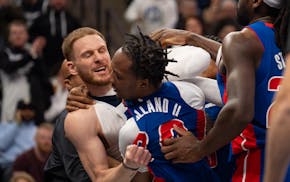
Wolves bounce back from second-quarter brawl to blow out Pistons 123-104
Twins swept by Cardinals to begin season as Bailey Ober stumbles in opener again
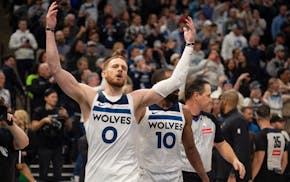
Souhan: Wolves, Edwards belatedly wake up following skirmish
Moore and Rinzel each make their NHL debut with the Blackhawks
